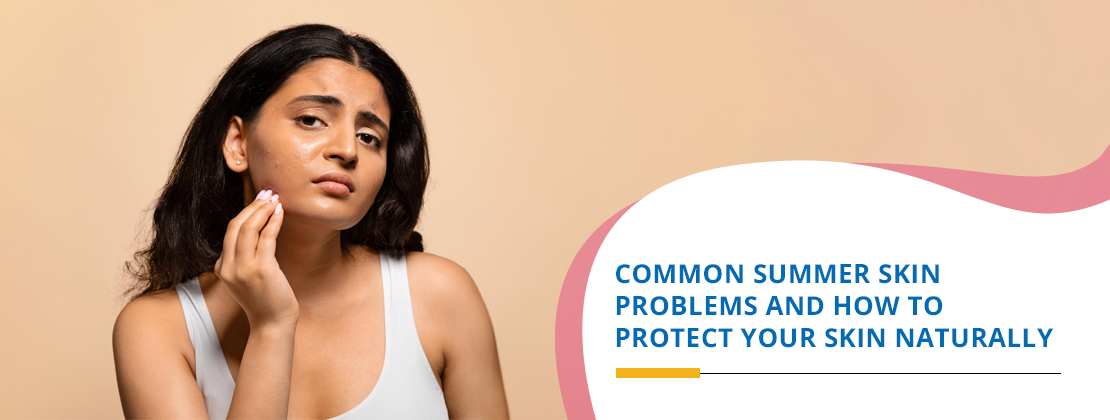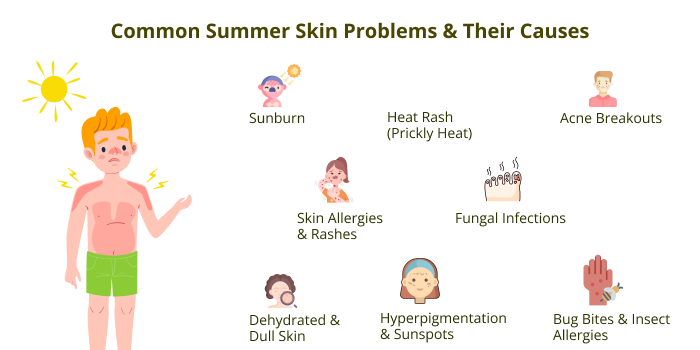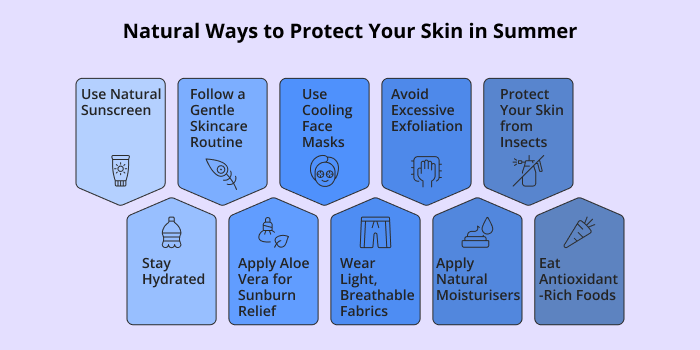
Home / Blog / Common Summer Skin Problems and How to Protect Your Skin Naturally
Summer brings warmth, sunshine, and outdoor activities, but it also comes with several skin problems. The truth is that the skin on your face can really suffer in the form of burns, spots, and other dermatological conditions due to the high temperatures and humidity. It is possible to prevent the skin from ageing and ensure that it remains attractive by taking up an appropriate summer skincare routine and using natural remedies. You can keep your skin healthy and glowing.

Sunburn
If you stay under the sun for too long without covering yourself, you will get burnt and feel a lot of pain. The ultraviolet rays go through the skin, where they destroy cells; hence, one can wrinkle quickly and develop cancer.
Heat Rash (Prickly Heat)
When it is hot and humid, people may get blocked sweat glands, which cause small red spots that make one feel like scratching. Such a problem occurs frequently in regions with skin creases, e.g., the neck, back, and armpits.
Acne Breakouts
In summer, people sweat more and produce more oil. This can block the pores and cause acne, especially on the face. Bacteria multiply in moist places and make pimples and rashes appear more serious and painful.
Skin Allergies & Rashes
Allergies may be caused by pollen, heat, or sweat, and this would make the skin feel itchy and swollen. Eczema and hives could also deteriorate due to surrounding allergens.
Fungal Infections
Fungus grows best when it is warm and damp. Athlete’s foot, ringworm, and yeast infections are caused by fungi that like warm, moist environments. These diseases are common in parts of the body that sweat more readily, like the feet, groin area, and underarms.
Dehydrated & Dull Skin
The skin may become dry and dull and have an uneven complexion due to moisture loss caused by high temperatures and air conditioning.
Hyperpigmentation & Sunspots
Too much sunlight can result in blemishes and an irregular complexion. Sun rays cause melanin to be manufactured, thus resulting in a type of pigmentation that is difficult to handle without medical interventions.
Bug Bites & Insect Allergies
Mosquitoes, bees, and other insects are more active in summer, leading to itchy, red bumps and, in some cases, allergic reactions.

Use Natural Sunscreen
Put on a sunscreen with an SPF of 30 that can protect you from all types of sun rays. If possible, use non-chemical blockers like those made of either zinc oxide or titanium dioxide.
Stay Hydrated
To keep your skin moist from within, take in lots of water and eat foods that have a lot of water in them like cucumber, watermelon and oranges.
Follow a Gentle Skincare Routine
Cleanse your face with a mild, natural cleanser twice daily to remove sweat and dirt. Opt for herbal toners like rose water to refresh and tighten pores.
Apply Aloe Vera for Sunburn Relief
Aloe vera has cooling and anti-inflammatory properties that soothe sunburnt skin. Apply fresh aloe gel directly to affected areas for quick relief.
Use Cooling Face Masks
Apply homemade face masks with ingredients like yoghurt, honey, and cucumber to soothe irritated skin and reduce inflammation.
Wear Light, Breathable Fabrics
Loose-fitting cotton clothes allow air circulation and reduce the risk of heat rash and fungal infections.
Avoid Excessive Exfoliation
Over-exfoliating can strip natural oils and increase sun sensitivity. Use gentle exfoliants like oatmeal or gram flour once a week.
Apply Natural Moisturisers
Use coconut oil, shea butter, or aloe vera gel to keep skin nourished without clogging pores.
Protect Your Skin from Insects
Use natural insect repellents like citronella oil or neem oil to prevent bug bites and irritation.
Eat Antioxidant-Rich Foods
Include berries, green tea, and nuts in your diet to combat free radicals and maintain healthy skin.
Additional Reading: Healthy Food Items to include in your Summer Diet
Summer can be harsh on the skin, but with the right precautions, you can prevent and manage skin problems effectively. A well-rounded summer skincare routine with natural remedies will help maintain radiant and healthy skin. Consulting a dermatologist in India or visiting a multispeciality hospital in India, like HCG, can provide professional guidance for severe skin conditions.
Wearing sunscreen with SPF 30 or higher, covering up with protective clothing, and avoiding direct sunlight during peak hours (10 AM–4 PM) can help prevent sunburn.
Natural remedies like lemon juice, yoghurt, and honey can help lighten a suntan. Exfoliating with a gentle scrub and applying aloe vera also aids in tan removal.
Drink at least 8-10 glasses of water daily, use hydrating face mists, and apply a lightweight moisturiser containing hyaluronic acid or aloe vera.
Keep the affected area cool and dry, apply calamine lotion, and wear loose clothing. Taking cool showers and using aloe vera or chamomile-based creams can also help soothe irritation.